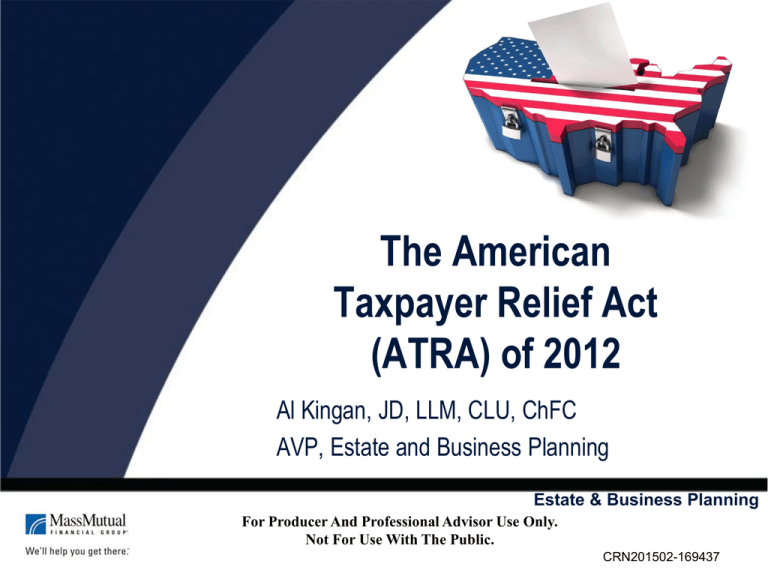
The American
Taxpayer Relief Act
(ATRA) of 2012
Al Kingan, JD, LLM, CLU, ChFC
AVP, Estate and Business Planning
Estate & Business Planning
For Producer And Professional Advisor Use Only.
Not For Use With The Public.
CRN201502-169437
Disclaimer
The information contained in this presentation is being provided with the
understanding that it is not intended to be interpreted as specific legal or tax
advice. Neither MassMutual nor any of its employees or representatives are
authorized to give legal or tax advice. The information provided herein may
not be relied on for purposes of avoiding any federal tax penalties.
Individuals are encouraged to seek the guidance of their own legal or tax
counsel. Any individuals involved in the estate planning process should work
with an estate planning team, including their own personal legal or tax
counsel.
For Producer And Professional Advisor Use Only.
Not For Use With The Public.
2
Main Topics of the Day:
New Tax Law Summary
Fiscal Cliff Averted?
Planning strategies
For Producer And Professional Advisor Use Only.
Not For Use With The Public.
Copyright AALU 2012 All Rights Reserved
3
Summary of Key Provisions of New Tax Law
Estate, gift and generation-skipping tax exemptions and rates*
Exemptions: $5,000,000 indexed from 2010 ($5,250,000 for 2013)
Flat tax rate above exemption amount: 40%
Permanent reunification of estate, gift and generation-skipping
transfer tax system
Portability made permanent
* Cost of these provisions is estimated to be $396.068 billion over 10
years by Congressional Budget Office (CBO) scoring of this tax act.
All estimates on this and later slides are from the CBO scoring of
ATRA 2012 and appear in RED.
For Producer And Professional Advisor Use Only.
Not For Use With The Public.
4
Summary of Key Provisions of New Tax Law
Other key provisions - Permanent
Extension of 10% (lowest) income tax bracket $442.641 billion/10yrs
Extension of lower tax brackets (25%, 28%, 33% and 35%) for
taxpayers with income at or below:
$319.711 billion/10yrs
$400,000 - single filers
$425,000 – head of household
$450,000 – married filing jointly
Extension of 15% (and lower) capital gains and dividend rates
(qualified dividends only) for taxpayers with income at or below:
$400,000 - single filers
$289.920 billion/10yrs
$425,000 – head of household
$450,000 – married filing jointly
For taxpayers with income above the threshold amount, both
dividends and capital gains will be taxed at 20%
For Producer And Professional Advisor Use Only.
Not For Use With The Public.
5
Summary of Key Provisions of New Tax Law
Other key provisions – Permanent
Repeal of the personal exemption phase-out (“PEP”) and itemized
deduction phase-out (“Pease”) on incomes at or below:
$250,000 - single filers
PEP and Pease: $10.514 billion/10yrs
$275,000 – head of household
$300,000 – married filing jointly
Pease phase-out is the lesser of 3% of excess over threshold amount, or
80% of allowable deductions (no reduction of medical, investment
interest or casualty/theft and gambling losses)
PEP phase-out is calculated at 2% for each $2,500 that taxpayer’s
adjusted gross income exceeds threshold amount
Example:
Jim and Sally are married and earn $350,000
Pease Adj: ($350,000 - $300,000) x 3% = $1,500 reduction
PEP Adj: ($350,000 - $300,000) / $2,500 = 20 * 2% =
= 40% reduction in allowable personal exemption
For Producer And Professional Advisor Use Only.
Not For Use With The Public.
6
Summary of Key Provisions of New Tax Law
Alternative Minimum Tax
$1,815.6 billion/10yrs
Permanent exemption increase for 2012 as follows:
$50,600 - single filers (from $33,750 current law)
$78,750 - married filing jointly (from $45,000)
Phase-out of exemption
Phase-out formula: Exemption is reduced by 25% of amount
that taxpayer’s AMT income exceeds:
$112,500 - single filers
$150,000 - married filing jointly
Now allows non-refundable credits against the AMT
Both exemption and phase-out threshold now indexed for inflation
Future inflation indexing eliminates yearly need for “patches”
For Producer And Professional Advisor Use Only.
Not For Use With The Public.
7
Summary of Key Provisions of New Tax Law
IRA Charitable Rollover – 2 year ext. thru 2013
$1.280 billion/10yrs
Over 70½, Tax free distribution from IRA to qualified charity of up
to $100,000
Meets RMD requirement
Transition rules:
Rollover to charity during January 2013 can count as a 2012
distribution
Taxpayers who took distribution in December 2012 can make a
cash gift to qualified charity during January 2013 that will be
treated as an eligible 2012 charitable rollover
Itemized deduction for state and local sales taxes in lieu of state
and local income taxes – also only 2 years
$5.538 billion/10yrs
Mainly helps those with large ticket purchases or who live in states with no income
tax
For Producer And Professional Advisor Use Only.
Not For Use With The Public.
8
Summary of Key Provisions of New Tax Law
Roth conversions for retirement plans
$12.186 billion/10yrs revenue
Applies to 401(k), 403(b), or 457(b) government plans
Any amount in a non-Roth account can be converted to a Roth
account in the same plan
Prior law permitted conversion only as to amounts eligible to be
withdrawn from plan (usually participant over 59½ or separated
from service)
New law permits conversion whether or not eligible for
distribution
For Producer And Professional Advisor Use Only.
Not For Use With The Public.
9
Summary of Key Provisions of New Tax Law
Misc. Provisions - permanent
Extend marriage penalty relief – 15% bracket, standard deduction and EITC
$84.630 billion/10yrs
Child tax credit (some refundability)
$354.493 billion/10yrs
Adoption assistance/credits
$5.580 billion/10yrs
Expanded dependent care credit
$1.791 billion/10yrs
Student loan interest deduction
$9.676 billion/10yrs
Employer provided education benefits
$11.477 billion/10yrs
Misc. – temporary
Child credit (expanded refundability) – 5 years
$50.518 billion/10yrs
American Opportunity Tuition Tax Credits – 5 years $67.280 billion/10yrs
College tuition (above line deduction) – thru 2013
$1.706 billion/10yrs
Mortgage insurance treated as mortgage interest - 1 yr $1.297 billion/10yrs
Energy efficient home and appliance credit – thru 2013 - 2 years
$2.446 billion/10yrs
For Producer And Professional Advisor Use Only.
Not For Use With The Public.
10
Summary of Key Provisions of New Tax Law
Misc. Business Provisions
Bonus depreciation – thru 2013 (2014 for certain “longer lived” and
transportation assets)
$4.956 billion/10yrs
R & D credit– thru 2013 (2 yrs)
$14.324 billion/10yrs
15 year straight-line cost recovery for qualified leasehold improvements,
qualified restaurant buildings and improvements and qualified retail
improvements – extended thru 2013 (2 yrs)
$3.717 billion/10yrs
Enhanced Sec. 179 expensing – thru 2013 (2 yrs)
$2.352 billion/10yrs
Full/partial exclusion gain on sale of certain small business stock held for
5 years – applies to stock acquired by 12/31/2013
$954 million/10yrs
Reduction in holding period of S Corp Stock to 5 years to avoid Built in
Gain Tax – applies to asset sales during 2012/13
$256 million/10yrs
For Producer And Professional Advisor Use Only.
Not For Use With The Public.
11
Financial Impact of New Tax Law
10 year cost estimated at over $3.96 trillion
Current debt ceiling limit is $16.394 trillion
Yet:
Some Congressional leaders have taken credit for raising $620
billion in new revenue through passage of ATRA 2012
Note the cited $620 billion figure is the difference between what
the tax law cost and what it would have cost if all Bush-era and
2010 Tax Act provisions had been permanently extended
For Producer And Professional Advisor Use Only.
Not For Use With The Public.
12
Not Impacted By New Tax Law
Social Security tax holiday is gone!
Base Social Security withholding tax back to 6.2% (from
4.2%) for employees
Self-employment tax back to 12.4% from 10.4%
2013 FICA tax base earnings limit: $113.700
Patient Protection and Affordable Care Act of 2010 adds 0.90%
surtax employee’s portion of FICA Medicare tax for income over:
$200,000 – Single taxpayers
$250,000 – Married couples
For Producer And Professional Advisor Use Only.
Not For Use With The Public.
13
Higher Medicare Payroll Tax - .90%
FICA
Medicare
(HI)
Social
Security
(OASDI)
Total
2011
2012
2013
Cap
1.45%
1.45%
2.35%1
None
4.20%
($4,486)
4.20%
($4,624)
6.20%
($7,049)
’11- $106,800
’12- $110,100
’13- $113,700
5.65%
5.65%
8.55%
Blended
1 Patient
Protection and Affordable Care Act adds 0.90 percent to employee portion:
a. Single individuals earning more than $200,000 per year and
b. Married couples earning more than $250,000 per year
Remember: Vested Deferred Compensation is subject to FICA,
including additional .90% Medicare Tax
For Producer And Professional Advisor Use Only.
Not For Use With The Public.
14
Not Impacted By New Tax Law
Medicare Tax Extended to Unearned Income in 2013
3.8% surtax on unearned income
Interest
Dividends
Capital Gains
Passive income
Rental income
Annuity payments (taxable portion)
Applies to Modified Adjusted Gross Income (MAGI) above:
$200,000 (Single)
$250,000 (Married filing joint)
$11,950 (Estates and Trusts)
Applies to lesser of :
Net investment income
Total income over threshold
Not indexed for inflation
For Producer And Professional Advisor Use Only.
Not For Use With The Public.
15
Medicare Tax Expanded
“Unearned Income”
Yes
Interest/Dividends
X
Capital gains
X
Rental and Passive income
X
Annuity “income”
X
No
Tax-exempt bonds
X
IRA/Qualified Plan distributions
X
Principal residence
X*
Vacation residence
X
Life Insurance death benefits, loans and
non-taxable distributions
X
* In excess of Exclusion amount ($250,000/$500,000)
For Producer And Professional Advisor Use Only.
Not For Use With The Public.
16
2013 Income Tax Bracket Summary
For Producer And Professional Advisor Use Only.
Not For Use With The Public.
17
Gifting and Estate Tax Basics
Permanent change to 40% tax rate*, Exemption $5 million, indexed from 2010
Gift, Estate and
Generation Skipping**
Calendar Year
2009
2010
2011
2012
2013
Future years
Tax Exemption
Tax Rate
$3.5 million
45%
$5 million
35%
$5 million
35%
$5.12 million
35%
$5.25 million
40%
$5.25 million + Inflation Adjustment
Annual Gift Tax Exclusions (2013): $14,000***
*Top marginal rate
** ATRA 2012 provides for indexing of Gift, Estate and GSTT exemptions
*** indexed for inflation
For Producer And Professional Advisor Use Only.
Not For Use With The Public.
18
Estate and Gift Tax Issues
Clawback Issue now irrelevant
At death, all gifts in excess of annual exclusions are added back to
decedent’s taxable estate
Gifts made during 2011 or 2012 (utilizing $5 million+ exemption)
that are added back to estate, will never exceed estate tax
exemption amount at time of death
Portability reduces need for Credit shelter or “by-pass” trust
Property ownership between spouses no longer crucial
Other considerations:
Estate tax return required to be filed at death of first spouse
Unused exemption not indexed for cost of living
Generation skipping exemption not portable
Growth out of estate if credit shelter trust funded
No basis step up for assets in credit shelter trust
For Producer And Professional Advisor Use Only.
Not For Use With The Public.
19
“Fiscal Cliff” is not over
THE CONGRESSIONAL
AGENDA…
Remaining “Fiscal Cliff” issues
Sequestration –
postponed to March 1st
Debt Ceiling
Technically reached
Required increase in
March/April timeframe
Federal Deficit issues
Source: The Committee for a Responsible Federal Budget, available at:
http://crfb.org/sites/default/files/Between_a_Mountain_of_Debt_and_a_Fiscal_Cliff.pdf
For Producer And Professional Advisor Use Only.
Not For Use With The Public.
20
The Fiscal Dilemma
As a share of GDP, spending and
revenue collection historically
average 19-20%
FY 2013 Projected Deficit: $1.2
trillion
National Debt: $16.4 trillion
Economic Growth Projections: 2.3%
in 2012; ten-year average: 2.5%
Structural budget and tax reform
likely in 2013???
Spending and Revenues
(% of GDP)
24.7%
26%
in 2011
24%
Total Outlays
22%
20%
18%
Total Revenues
16%
14%
12%
1950
1950
14.8%
in 2011
1959
1959
1968
1968
1977
1977
1986
1986
1995
1995
2004
2004
2010
Sources: OMB, CBO
Source: Office of Management and Budget, FY 2013 Mid-Session Review, available at: http://www.whitehouse.gov/omb/budget/MSR
For Producer And Professional Advisor Use Only.
Not For Use With The Public.
Copyright AALU 2012 All Rights Reserved
21
2011
Remaining “Fiscal Cliff”
Debt Ceiling limit approaching - $16.4 trillion
Tim Geitner told Congress Debt Ceiling was reached on December
26th. Government accounting steps taken to postpone day of
reckoning until early March
Congress extended Government borrowing authority in a bill
informally called “no budget, no pay” which raises the debt ceiling
by $450 billion until May 18th, 2013
If there is no budget by April 15, 2013, Congress forgoes their
paychecks until a budget blueprint is passed
Mandated roughly $600 billion in across-the-board spending cuts
take effect January 1 – Budget Control Act of 2011
Postponed to by ATRA 2012 to March 1, 2013
Over 1,000 government programs will receive deep, automatic
cuts, including Defense and Medicare
For Producer And Professional Advisor Use Only.
Not For Use With The Public.
22
Income Taxes in 112th / 113th Congress
TAX REFORM…What we know
“Tax expenditures” serve as most
significant source of revenue available
for reform ($1.1T annually)
Life insurance policy inside build-up
and death benefits – 12th largest tax
expenditure ($150 billion over five
years)
For Producer And Professional Advisor Use Only.
Not For Use With The Public.
Copyright AALU 2012 All Rights Reserved
23
Select Tax Expenditures – “Cost” in Billions 2011-2015*
Mortgage interest deduction
Real Estate Taxes
Charitable contributions
State and local, sales, and personal property taxes
Exclusion of gain on sale of residence
Carry over basis on gifts
Step-up in basis at death
Reduced rates capital gains/dividends
Exclusion of Cafeteria benefits (IRC 125)
Employer medical benefits
Pension contributions and earnings
Municipal bond interest
Not taxing inside build-up life insurance/annuities
$464.1 billion
$117.1
$242.6
$230.3
$123.2
$ 26.6
$230.8
$456.6
$197.6
$725.0
$804.8
$177.6
$148.3
*Joint Committee on Taxation Estimates of Federal Tax Expenditures 2011-2015 (1/17/12)
Before passage of American Taxpayer Relief Act of 2012
For Producer And Professional Advisor Use Only.
Not For Use With The Public.
24
What to Do?
Planning Opportunities
For Producer And Professional Advisor Use Only.
Not For Use With The Public.
25
2013 Planning Opportunities
Income Tax Planning
Closely monitor level of income - rate brackets, surtaxes, deduction phaseouts
Deferred compensation planning – no impact on application of .90%
Medicare surtax
Client investment changes to reduce impact of 3.8% surtax
Consider whether to convert from flow-thru entity to C Corporation
Especially if follow-thru on campaign promises to reduce corporate
income taxes
Lower corporate tax rate to 28%
Lower corporate rate on manufacturing to 25%
For short-term cash flow needs, consider low interest corporate loans rather
than payment of compensation
For Producer And Professional Advisor Use Only.
Not For Use With The Public.
26
2013 Planning Opportunities
Estate Planning
Gifting/Dynasty Trust planning remains vibrant for very wealthy
Leverage gifts with discounts
Leverage with low interest rate planning
Don’t forget about State Estate taxes and planning
No Portability for state law purposes
Use it or lose it – Some key planning techniques may be at risk
Life Insurance
Greater opportunities to hold personally rather than need to transfer to
irrevocable trust
Life insurance in Qualified Plans* may become more popular
Less concern that death benefit is includable in estate
Pay premiums with pre-tax dollars
In situations where premium is in excess of annual exclusions, consider a
part-gift, part-loan arrangement
*Due to the complexity involved in this process, individuals are advised to consult with their tax adviser about the tax
consequences associated with the purchase of life insurance in a qualified plan and to determine the proper methodology
to use in executing such a plan.
For Producer And Professional Advisor Use Only.
Not For Use With The Public.
27
Planning for 3.8% Medicare Tax
Tax on investment income – dividends, interest, capital gains,
distributions from annuities, rental income, passive business income
Does not apply to retirement plan distributions (including IRAs) although
this income does impact MAGI and potential application of tax
Does not apply to interest from municipal bonds
Does not apply to life insurance loans and non-taxable distributions
Applies to trusts
Early planning strategies:
Did I mention Life Insurance?
Non-taxable investments may become more popular than ever
Although -Tax expenditure item possibly in play to help pay for tax cuts
Dividend paying stocks less popular?
Tax efficient investments (low turnover and low dividends)
Tax deferred investments (annuities)
Nondeductible IRAs – the wallflower no more
For Producer And Professional Advisor Use Only.
Not For Use With The Public.
28
Low Interest Rate Planning Opportunities
Applicable Federal Rates
Rate Comparison
Short-term AFR
Nov. 2007
4.11%
Dec. 2008 March 2013
1.36%
.22%
up to 3 year term loans & demand loans (see note below)
Mid-term AFR (3+ to 9 years)
Long-term AFR (9+ years)
4.39%
4.89%
2.85%
4.45%
1.09%
2.66%
7520 Rate
5.20%
3.40%
1.40%
Demand Loans - Annual Demand Loan rate is published by the IRS each year. IRS
calculates rate by adding 50% of short-term January rate and 50% of short-term July rate.
For example, in 2012, the January rate was .19% and the July rate was .24%. The
average of .215% was rounded to .22%. Here are blended rates over past few years:
2012 - .22%
2011 - .40%
2010 - .59%
2009 - .82%
2008 - 2.80%
2007 - 4.92%
For Producer And Professional Advisor Use Only.
Not For Use With The Public.
29
Gifting Still Beneficial: Gifts to Trust Rather than Outright
Why gifts into trust?
Trust assets can continue to be available for grantor’s family
through a spouse or children named as eligible beneficiaries
Protection from creditors and predators
Grantor can borrow from trust, paying reasonable interest rate
Grantor can retain right to substitute assets of equal value
Grantor’s spouse can be given testamentary power of
appointment to change distribution terms of trust at her death
Trust can appoint a “trust protector” with power to change trust
terms in event of change in family circumstances or tax laws
Trust assets remain outside of taxable estate of beneficiaries
Grantor can retain power to remove and replace trustee
For Producer And Professional Advisor Use Only.
Not For Use With The Public.
30
Gifts into Trust (cont.)
Grantor trust rules can further enhance flexibility and ability
of trust to appreciate in value
Grantor is taxed on all trust assets as if still owned by grantor
Transactions between trust and grantor are not recognized for
income tax purposes
No gain recognized on transactions between grantor and trust
No interest required to be reported on loan transactions
Grantor’s payment of taxes on trust income is not considered a
gift to trust
Trust is permitted to grow tax free, while grantor’s assets
(which are subject to creditors and estate taxes) are depleted
For Producer And Professional Advisor Use Only.
Not For Use With The Public.
31
Part Gift / Part Split Dollar Loan
Life insurance premiums may exceed gifting capability,
but rather than doing a Split Dollar arrangement, grantor
decides to lend shortfall to irrevocable trust
Example, Gil, age 50 desires to purchase a MassMutual
Whole Life Legacy 65 policy (Select Preferred NonTobacco) with $200,000 annual premium in ILIT
Available annual exclusions total $78,000
Gil will loan remaining premium to trust
Premium loan will have same loan options that we’ve already
discussed:
Demand loan with annualized short term rate used to measure
required interest
Term loans using mid-term rate or long term rate
Remember that each new premium is a new term loan
For Producer And Professional Advisor Use Only.
Not For Use With The Public.
32
Part Gift / Part Split Dollar Loan –
Assume 15 yrs policy premiums of $200,000
Let’s take a look at our example assuming 2.66% (March ‘13 long term) interest rate over
life of loan (over long term a higher rate may be required)
Annual
Cumulative
Year
Outlay
Gift
Loan
Interest*
Loan Y/E
1
200,000
82,000
118,000
3,139
121,139
2
200,000
82,000
118,000
6,361
245,500
3
200,000
82,000
118,000
9,669
373,169
4
200,000
82,000
118,000
13,065
504,234
5
200,000
82,000
118,000
16,551
638,786
10
200,000
82,000
118,000
35,424
1,367,171
11
200,000
82,000
118,000
39,506
1,524,677
12
200,000
82,000
118,000
43,695
1,686,372
15
200,000
82,000
118,000
56,945
2,197,725
16
82,000
56,278
2,172,003
17
82,000
55,594
2,145,597
20
82,000
53,430
2,062,090
25
82,000
49,423
1,907,430
*Loan interest
Accrued
For Producer And Professional Advisor Use Only.
Not For Use With The Public.
33
Part Gift / Part Split Dollar Loan –
Assume 15 yrs policy premiums
Age 50, Select Preferred, Non-Tobacco, Whole Life Legacy 65
Initial Death Benefit $5,344,828, Premium of $200,000
Year
Cumulative
Loan Y/E
1
2
3
4
5
10
11
12
15
16
17
20
25
121,139
245,500
373,169
504,234
638,786
1,367,171
1,524,677
1,686,372
2,197,725
2,172,003
2,145,597
2,062,090
1,907,430
Non-Guaranteed
Policy CV*
12,186
163,620
358,667
562,429
775,568
2,067,266
2,336,980
2,693,875
3,808,802
4,041,276
4,286,189
5,098,327
6,748,130
Non-Guaranteed
Death Benefit*
5,378,559
5,414,488
5,455,216
5,501,042
5,553,446
6,051,907
6,198,567
6,364,245
6,983,375
7,223,401
7,472,435
8,265,503
9,783,018
For Producer And Professional Advisor Use Only.
Not For Use With The Public.
*These values are
not guaranteed.
They include
dividends that are
neither estimates
nor guaranteed, but
are based on the
2013 dividend scale.
Dividends in future
years may be higher
or lower depending
on the company’s
experience.
34
Part Gift / Part Split Dollar Loan – Case Study cont.
Benefits of Arrangement:
Funding of life policy premiums with no current gift tax impact
Payments on outstanding loan can be used to supplement Grantor’s retirement
income
Other Considerations:
Calculations on prior slide assume a demand or term loan arrangement
using the March 2013 long term rate of 2.66%
2012 Annualized demand loan rate was .22% (March 2013 - .22%)
Parties can convert demand loan to term loan at any time to lock in a low
interest rate for a period of time
Higher future interest rates may require an increase in amount of interest
charged
Future annual exclusion increases will help to offset some interest increases
Outstanding loan balance will be includable in Grantor’s taxable estate
For Producer And Professional Advisor Use Only.
Not For Use With The Public.
35
Generation Skipping Opportunities in Trust
Typically estate planning trusts are designed to terminate upon
last to die of grantor and spouse. At that time trust would be
distributed to children of grantor. If a child had predeceased,
trust may continue until deceased child’s heirs attained a
certain age or maturity.
A Generation Skipping Trust is designed to continue to hold
trust assets beyond the children’s generation for the benefit of
grandchildren, great grandchildren or longer. A “Dynasty
Trust” is designed to continue indefinitely, or at least as last as
long as state law allows.
ForProducer
ProducerAnd
AndProfessional
Professional Advisor
For
AdvisorUse
UseOnly.
Only.
NotFor
ForUse
Use With The
Not
ThePublic.
Public.
36
Generation Skipping Opportunities in Trust - Benefits
Assets in trust are not includable in taxable estate of beneficiaries
Creditor protection
Trust assets not subject to creditors of trust beneficiaries
Helps to ensure that inheritance your clients provide to their
descendants does not end up in the hands of ex-spouses
Flexibility in distributions
Trust can be structured as a “Family Bank”
Protection and Preservation of family wealth
Retention of control over asset disposition
For Producer And Professional Advisor Use Only.
Not For Use With The Public.
37
Generation Skipping Trusts – Why Life Insurance?
Leverage GSTT Exemption
GSTT Exemption allocated against gifts to pay premiums,
significantly increasing ultimate exempt transfer
Death benefit substantially increases value of trust at death
of grantor or grantors, providing trust beneficiaries with
enhanced Gift and Generation Skipping tax leverage
Policy cash values*, and other trust assets, can be used to
benefit trust beneficiaries prior to death of grantor/Insured
*Distributions under the policy (including cash dividends and partial/full surrenders) are not subject to
taxation up to the amount paid into the policy (cost basis). If the policy is a Modified Endowment Contract,
policy loans and/or distributions are taxable to the extent of gain and are subject to a 10% tax penalty.
Access to cash values through borrowing or partial surrenders will reduce the policy’s cash value and
death benefit, increase the chance the policy will lapse, and may result in a tax liability if the policy
terminates before the death of the insured.
For Producer And Professional Advisor Use Only.
Not For Use With The Public.
38
Leveraging Gifts
Minority interests in closely-held businesses will generally
be discounted for lack of control, lack of marketability, lack
of diversity, etc.
Limited partnership interests (holding real estate, securities,
etc.) are generally discounted as a result of prohibition on
owner’s participation in management activities
Life insurance can be an excellent way to leverage gifts for
kids, grandkids and future generations
For Producer And Professional Advisor Use Only.
Not For Use With The Public.
39
Low Interest Rate Planning - Gift Loans
Loans to Trust or Kids to purchase assets from Donor/Lender
Loans to purchase life insurance
Arbitrage loans – Earnings can help pay life premiums
Example: Grantor lends $20 million to irrevocable trust
Trust pays interest of $218,000 annually for 9 years at 1.09% (March)
If trust earns 5% on its investments, that’s $1 million, resulting in net
annual cash flow to trust of $782,000
Over 9 years, over $7 million of gift tax free cash flows into trust
Grantor pays any income taxes on trust’s investment earnings under
grantor trust rules
At end of loan term, loan could automatically renew for anther 9 year
period, but at current interest rate
Term could be longer (20, 30, 40 years) at Long Term Rate (2.66%)
Important: Trust should contain “seed money” equal to 10% of amount
loaned to trust – this can be gifted prior to loan transaction
For Producer And Professional Advisor Use Only.
Not For Use With The Public.
40
Low Interest Rate Planning
Installment Sale of Discounted Assets to Grantor ILIT
Installment Sale of Discounted Entity Assets to Grantor Trust (Intentionally
Defective Irrevocable Trust-”IDIT”)
Step 1: Trust should be “seeded” with gift of at least 10% of value of assets
involved in installment sale
IRS will disregard sale arrangement if trust looks solely to assets sold as
the source to repay note and interest
Step 2: Grantor sells business interests to trust
Sale price of minority interest eligible to be discounted
Sale in exchange for promissory note for term of years
Requires interest of at least AFR (Sec. 7872 rate)
Results:
Under Grantor trust rules, no reportable gain on sale and no taxation on
trust interest payments
Income generated on assets in trust taxable to Grantor
Sale of Discounted Assets at Low Interest Rate may work as an effective
Estate Freeze technique
For Producer And Professional Advisor Use Only.
Not For Use With The Public.
41
Act Now Before it Goes Away
Window of opportunity may be closing for many of these planning options:
Congress is looking at many different options to raise revenues in order to
cut federal deficits and to spare some of scheduled sunset changes
Included among options being considered by Congress:
Eliminating ability to create an irrevocable “grantor trust” that is not includable
in grantor’s taxable estate
Creating a 90 year rule against perpetuities for generation skipping trusts –
meaning that after 90 years, a generation skipping tax will be imposed on the
assets in a generation skipping trust
Eliminating discounts on transfers of non-business property
Requiring a minimum 10% taxable gift on transfers into a GRAT
Requiring that GRATs must last for a minimum of 10 years
Restricting Crummey withdrawal rights as creating annual exclusion gifts
For Producer And Professional Advisor Use Only.
Not For Use With The Public.
42
Illustration
For Producer And Professional Advisor Use Only.
Not For Use With The Public.
43
®
Whole Life Legacy 65 (WL-2007 and WL-NC-2007) is a level-premium,
participating, permanent life insurance policy issued by Massachusetts Mutual Life
Insurance Company, Springfield, MA 01111-0001
©2013 Massachusetts Mutual Life Insurance Company, Springfield, MA. All rights reserved. www.massmutual.com. MassMutual Financial Group is a
marketing name for Massachusetts Mutual Life Insurance Company (MassMutual) and its affiliated companies and sales representatives
For Producer And Professional Advisor Use Only.
Not For Use With The Public.
44








